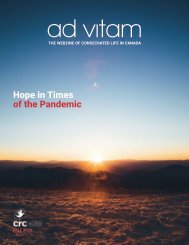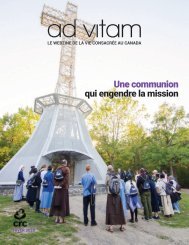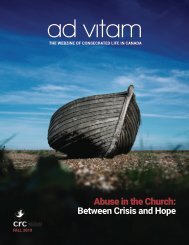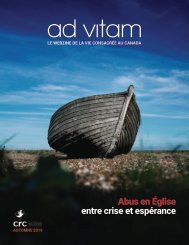ad vitam - Winter 2020
READING TIPS The ad vitam webzine is unique in its offer of an integral and interactive experience featuring articles and audio-visual content. We strongly suggest that you read it online, ideally on a computer or tablet (not recommended on a smartphone). To zoom in: on a computer, double-click or use the + and - found at the bottom-right of the screen; on a tablet, double-tap the screen. Use your mouse or finger to move throughout the page. It is possible to download a PDF of the webzine, however the file will not support links and audio-visual content. For environmental reasons, we invite you to limit printing of the PDF. You may contact us if you wish to obtain a text-only version of a specific article. We hope that as you acquaint yourself with our webzine over time, you’ll enjoy the enriching experience of its unique format. We welcome your comments and questions at info@crc-canada.org.
READING TIPS
The ad vitam webzine is unique in its offer of an integral and interactive experience featuring articles and audio-visual content. We strongly suggest that you read it online, ideally on a computer or tablet (not recommended on a smartphone). To zoom in: on a computer, double-click or use the + and - found at the bottom-right of the screen; on a tablet, double-tap the screen. Use your mouse or finger to move throughout the page.
It is possible to download a PDF of the webzine, however the file will not support links and audio-visual content. For environmental reasons, we invite you to limit printing of the PDF. You may contact us if you wish to obtain a text-only version of a specific article. We hope that as you acquaint yourself with our webzine over time, you’ll enjoy the enriching experience of its unique format. We welcome your comments and questions at info@crc-canada.org.
Create successful ePaper yourself
Turn your PDF publications into a flip-book with our unique Google optimized e-Paper software.
Youth is more than simply a period of time; it is a state of<br />
mind. That is why an institution as ancient as the Church can<br />
experience renewal and a return to youth at different points in<br />
her age-old history. Indeed, at the most dramatic moments of<br />
her history, she feels called to return with all her heart to her<br />
first love.<br />
Post-synodal Apostolic Exhortation Christus vivit, no. 34.<br />
reach him at all. While this type of gathering<br />
suits his parents and the other <strong>ad</strong>ults, that isn’t<br />
the case for him. So, he stays as far away as<br />
possible. Sitting on the window sill at the back<br />
of the room, he is symbolically on the border<br />
between the space lit by the Gospel and the<br />
darkness outside, that of a world without the<br />
light of Christ. Focused on their own experience,<br />
the community does not seem to care<br />
about him.<br />
Luke reports that this young man ends up<br />
falling asleep. He falls backwards into the<br />
darkness, from the top of the third floor, and he<br />
kills himself. As is often the case, the author<br />
of Acts expresses himself here in colourful<br />
language with theological significance. We<br />
understand his point by comparing it to what<br />
Paul writes in I Thess 5:4-6: “But you, brothers,<br />
do not live in the dark… No, you are all children<br />
of light and children of the day: we do<br />
not belong to the night or to darkness, so we<br />
should not go on sleeping, as everyone else<br />
does, but stay wide awake and sober.”<br />
In fact, the falling asleep of Eutychus means<br />
that he is closed to the Word of God. He thus<br />
sinks into the darkness of spiritual death. At<br />
first glance, this youth has a first name which<br />
contr<strong>ad</strong>icts his experience. Eutychus actually<br />
means “the lucky one.” But things will not stay<br />
that way.<br />
Invigorating attitudes for young people<br />
Witnessing this fall, Saint Paul hastens to<br />
descend from the upstairs room to be by the<br />
young man’s side. The apostle exhibits pastoral<br />
attitudes that are absolutely remarkable.<br />
He does not hesitate a second to leave the<br />
room bathed in light to descend down into the<br />
darkness where the young man was in danger<br />
of death. He leaves behind the liturgical<br />
assembly to put himself at the level of the <strong>ad</strong>olescent.<br />
He takes care of him personally. Paul<br />
gives him the entire quality of his presence: he<br />
takes him in his arms (v. 10)! We could even<br />
translate the Greek verb (sumperilambanô) by<br />
saying that he embraces him. It is a presence<br />
of tenderness, a loving presence. We see that<br />
Eutychus becomes his priority. He provides<br />
him with personalized pastoral care, <strong>ad</strong>justed<br />
to his reality. Paul resembles the shepherd of<br />
the parable who leaves the 99 sheep of the<br />
flock to go in search of the lost one (Lk 15:4).<br />
As a result of his efforts, Paul is able to exclaim,<br />
“There is no need to worry, there is still life in<br />
him” (v. 10). As a result of an <strong>ad</strong>apted intervention,<br />
the young man opened himself to the life<br />
of the Gospel, he went from death to Life. The<br />
name that Luke chose to give to his character<br />
takes on its full meaning. Eutychus is lucky to<br />
have encountered a missionary like Paul.<br />
AD VITAM • WINTER <strong>2020</strong> • 15










